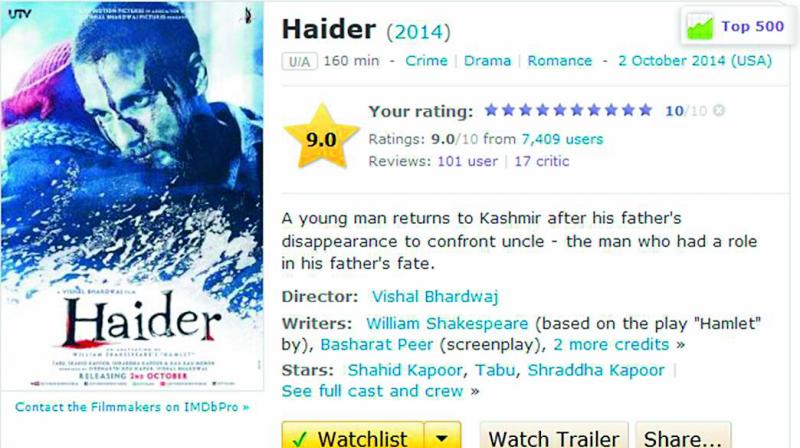Explained: How audiences utilise reviews to their advantage before watching film
Several moviegoers reveal that multiple online reviews are their go-to option before deciding to watch a film.

Movies are an every-Friday indulgence for the average cine buff but for others, watching a film is based on factors like the cast and crew, posters and trailers.
There’s also a set of viewers who watch films only after checking out reviews, with traffic on websites like IMDb, RottenTomatoes, Metacritic and other such popular portals providing ample proof.
Further, moviegoers do not form an opinion based on just one review and refer to multiple platforms to check for authenticity. Like a reader of Deccan Chronicle who recently thanked us for the review of Three Billboards Outside Ebbing, Missouri, and shared that he verified the ratings on some of the above sites before deciding to watch the film.
Elaborating on the same, Rohit Jain of city-based startup Dhundhoo explains, “Reviews are the only parameter to evaluate a movie before watching it. Going for a movie is quite a costly affair, both in terms of money and time and I’d like to know if a movie matches my taste.”
He adds, “While critic reviews only help you dissect a movie better, I choose user reviews instead, and refer to IMDb etc. And even though reviews influence my decision, if the film has my favourite stars Tom Hanks or Tom Cruise, I’ll watch the film, no matter what the world has to say.”
His views are reflected by Abhishek Mudaliar, Product Support Analyst at IBM, who shares, “I’d end up watching a Johnny Depp movie regardless of what the reviews say. However, I read multiple reviews on various sites and form my opinion based on what a majority of them say. Sometimes reviews may be skewed based on the target audiences, and so, it’s good to consider personal recommendations too.” Abhishek says he swears by Common Sense Media to “evaluate movies based on violence, profanity and alcohol/drugs/smoking portrayals” and that “it’s the best site for parents to make informed media choices for their kids”.
Interestingly, for many people, these websites serve as a guide to “foreign films”. Also, the reviews aren’t just about movies in theatres but also cover the wide range of content across digital platforms. “While I go by my daughter’s opinion for Hindi and Telugu films, these sites are a huge reference point for films of other languages. I love watching good films, but I have neither the patience nor the time to sit through two hours of a bad movie, especially when dozens of good movies are available online. IMDb is a reliable film rating site where I can get consistently compatible reviews. As the line has to be drawn somewhere, I have done it at a rating of 7.5,” shares businessman G. Anil Kumar, distributor of Bombay Dyeing, as he adds, “My only complaint is that these sites reduce opportunities to call good old friends for reviews, thereby reducing interactions.”
Notably, most of them prefer reviews over personal recommendations. As explained by filmmaker Sulochana Surapu, co-director, Fidaa, “Personal recommendations can tell me if a movie is good or not, but they are not specific enough to understand if I want to watch a movie. However, once I get these opinions, I’d surely evaluate the reviews too and then decide. Ratings give a clearer picture.” Sulochana admits that she too refers to these sites mostly for
“foreign films”. She adds that she’s almost always influenced by extreme reviews. “I would surely watch a film if the review says ‘too good’ and avoid it if it says ‘too bad’. For moderate reviews, I’d go with my gut feeling,” she reasons.
While they all seem to swear by reviews, there’s a common sentiment that Rohit summarises: “I listen to everyone but do what feels right for me. I think most people don’t completely trust reviews but just use them as a help to form a preliminary opinion on films.”

